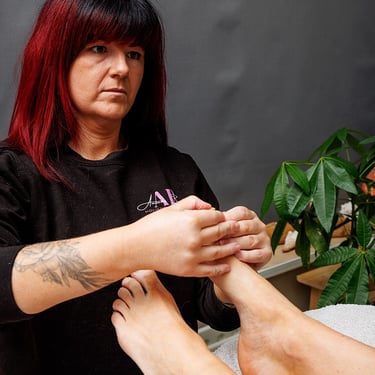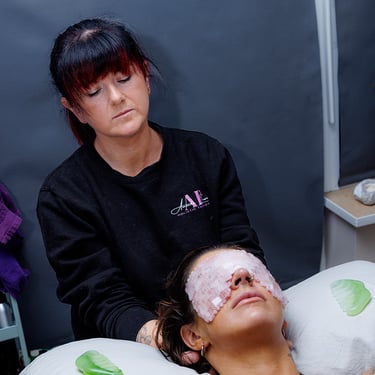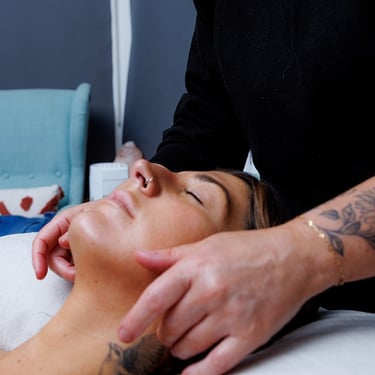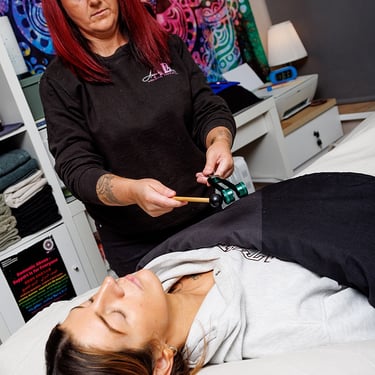Exploring The Benefits of Managing Menopause Through Reflexology
Amanda Brown
4/2/20242 min read


Menopause, a natural phase in a woman's life, marks the end of menstrual cycles. While it's a normal transition, it often comes with a variety of symptoms that can disrupt daily life. From hot flashes and mood swings to insomnia and fatigue, managing menopause can be a challenging journey. However, one holistic approach that has gained attention for its potential benefits is reflexology. Let's delve into the world of reflexology and discover how it can help women navigate through this significant life transition.
Understanding Reflexology
Reflexology is an ancient healing practice that involves applying pressure to specific points on the feet, hands, or ears to stimulate the body's natural healing process. It is based on the principle that these points, known as reflex areas, correspond to different organs and systems in the body. By manipulating these reflex areas, reflexologists aim to promote balance and overall well-being.
Alleviating Menopausal Symptoms
Hormonal Balance: Reflexology is believed to help balance hormone levels, which can alleviate many menopausal symptoms. By targeting specific reflex points associated with the endocrine system, reflexologists aim to regulate hormone production and distribution, potentially easing symptoms like hot flashes and mood swings.
Stress Reduction: Menopause can be a stressful time for many women, as they navigate physical and emotional changes. Reflexology promotes relaxation by releasing tension and stress, which can have a positive impact on mood and overall mental well-being.
Improved Sleep Quality: Insomnia and disrupted sleep are common complaints during menopause. Reflexology sessions may help improve sleep quality by promoting relaxation and reducing anxiety levels. By focusing on reflex points associated with the nervous system and relaxation response, reflexologists aim to induce a state of deep relaxation conducive to restful sleep.
Enhanced Circulation: Poor circulation is another issue that can exacerbate menopausal symptoms such as fatigue and muscle aches. Reflexology techniques stimulate blood flow to various organs and tissues, promoting oxygen and nutrient delivery while aiding in the removal of toxins. Improved circulation can boost energy levels and alleviate discomfort associated with menopause.
Supporting Emotional Well-being: Menopause can trigger a range of emotional responses, including anxiety, irritability, and sadness. Reflexology aims to support emotional well-being by releasing endorphins, the body's natural feel-good hormones, and promoting a sense of calm and relaxation.
Integrating Reflexology into Menopausal Care
Incorporating reflexology into a comprehensive menopausal care plan can offer women a holistic approach to managing their symptoms. While reflexology alone may not be a cure for menopause, it can complement other therapies and lifestyle modifications to enhance overall well-being.
When considering reflexology for menopausal management, it's essential to consult with a qualified reflexologist who understands the specific needs and concerns of menopausal women. Additionally, it's crucial to approach reflexology as part of a balanced lifestyle that includes regular exercise, a healthy diet, adequate sleep, and stress management techniques.
Conclusion
Managing menopause is a unique journey for every woman, and finding effective strategies to navigate through this transition is key to maintaining quality of life. Reflexology offers a gentle yet powerful approach to addressing the physical and emotional symptoms of menopause, promoting balance, relaxation, and overall well-being. By incorporating reflexology into their menopausal care routine, women can empower themselves to embrace this new phase of life with vitality and resilience.
Embrace the Journey,
Amanda Brown




Belfast, Co. Antrim, N. Ireland BT15
t: 07479988490
e: info@amandabrownholistics.co.uk